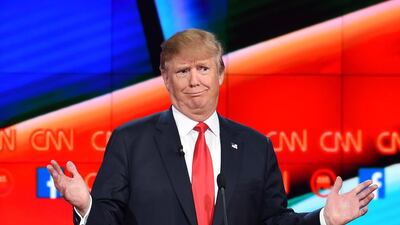Is Donald Trump a unique “anti-fragility” test for the United States? Nassim Nicholas Taleb, the Lebanese-American former derivatives trader who shares an alma mater and a tendency to bombast and self-aggrandisation with Mr Trump, would probably say “yes”.
Mr Taleb’s book on “anti-fragile things that gain from disorder” argues that countries such as Lebanon, which have gone through war and confusion of every sort, develop immunity and “thrive and grow”under stress. This is quite different, he says, from simply being resilient, which is all about resisting shocks and remaining unchanged.
Anti-fragility is about becoming better because of the “continuous fear of chaos”.
In theory then, the US should benefit, in Mr Taleb’s words, from the “volatility, disorder and stressors” that are testing America’s values and sense of itself each time Mr Trump opens his mouth.
The most recent, of course, was his “exclude Muslims” comments after the California mass shooting. It is extraordinary and upsetting to see that the remarks appear to have done Mr Trump’s domestic popularity no harm. In fact, the new NBC-Wall Street Journal poll of Republican Party voters, published this week, found that he is yet again leading the field and is actually up four percentage points from late October.
Then there is the downright meanness and violence that routinely breaks out at Mr Trump’s magnificently well-attended rallies.
In Birmingham, Alabama, late last month, a well-known black civil-rights activist was punched and kicked by Trump supporters even as the candidate spoke. The same happened to immigration activists in Miami earlier that month. In Washington in September, a young Latino woman was spat on and had her hair pulled for protesting against Mr Trump’s racist slurs.
Mr Trump seems to draw out the very worst from every crowd because he has made plain that he sees the world in a binary way, a black and white toss-up between winners and losers, good and bad, strong and weak, smart and stupid. What will that mean for America, or indeed for American Muslims and for Muslims who travel to America to work, study, holiday or visit family? What effect will the Trump “stressors” have on Mexican immigrants in the US, American proponents of immigration, black Americans, anyone with a visible physical disability who happens to cross Mr Trump?
There is much head-shaking around the world and perhaps rather too much hysteria as well, what with a recent petition to ban him from the UK.
However, there is something to be said for Canadian academic Saqib Qureshi’s analysis that “Trump is tanking the American brand globally”.
Dr Qureshi, who writes about identity politics, says that Canadians and much of the world are paying close attention even at this early stage of the US presidential contest because all of America’s proclamations about freedom, equality and human rights cannot hide the fact “that a religious bigot and racist actually (once) led one of the two political parties’ race to become president".
It has been said often enough that Mr Trump is able to bring out the worst in his supporters because that hate and prejudice already exists deep within them. Post-September 11 unease about Muslims. Prejudice against African-Americans. Fear of foreigners. And yet, recent history shows that America’s biases have served as “stressors” that serve to boost its anti-fragility.
Three examples of populist demagogues are worth citing. The first: Louisiana’s Depression-era governor Huey Long, who began a badly-needed public works programme but off the back of ugly rhetoric that depicted the rich as “parasites”. Then there was Wisconsin senator Joe McCarthy, who whipped up the Reds-under-beds fear into a dangerously charged campaign of hate. And finally, another southern governor, George Wallace of Alabama, who exploited 1960s fears about equal rights for black people. To each stress test, America responded with a proper respect for rule of law and a progressive sense of itself by recognising its biases as they were.
Will Mr Trump’s Muslim “stressor” prompt the same epiphany?
America’s fear of Muslims runs deep. Consider the results of the first study of religious identity and workplace discrimination against American Muslim doctors. Conducted two years ago, much before the California shootings, the full flowering of ISIL and before Mr Trump announced his intention to run for president, the study has just been published in AJOB Empirical Bioethics, which is affiliated with the American Journal of Bioethics. It found that nearly half of the Muslims doctors surveyed felt more scrutiny at work compared to their peers. Nearly one in four said they experienced religious discrimination during their careers. Almost 10 per cent said patients had refused their care because they were Muslim.
And yet, the reality is that unlike in parts of Europe, Muslims in the US are well along the way to being assimilated. As happened with Italians and other southern Europeans who were reviled and branded a security threat to America less than a hundred years ago, the cycle of rejection, integration and acceptance may be destined to play itself out with Muslims as well. Mr Trump may force a reconsideration and ultimate rejection of American Islamophobia.
Rashmee Roshan Lall is a writer on world affairs
On Twitter: @rashmeerl


